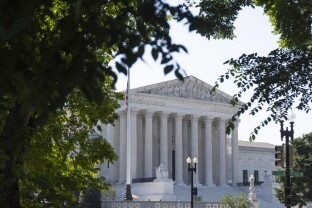Louisiana lawmakers and voting rights advocates are closely watching the ongoing partisan dispute over Texas’ congressional district map, knowing that their own map is anything but settled.
While Louisiana has not been pulled into the broader redistricting battle that Democrats and Republicans are waging, the state knows firsthand how long these fights can draw out.
The Supreme Court has yet to make a decision on a case revolving around Louisiana’s 2024 congressional map, which created a second majority-Black district in the state. That means that halfway to the next census, it’s in the unusual position of still not knowing its final district lines after years of court battles. And a new request from the Supreme Court that broadened the scope of the case has upped the ante.
“Listening to them speak about what’s going on, and having been in the conversations as to what’s going on in Louisiana, as far as redistricting, it’s just really becoming more evident … it’s all about diluting the votes of minorities who are in the state,” said Louisiana Democratic state Rep. Candace Newell.
Newell attended a press conference in Boston on Wednesday with Texas lawmakers who fled their state to deny Republicans the quorum they need to pass a new congressional district map that would favor Republicans.
Louisiana v. Callais addresses a challenge brought by 12 Louisiana voters who identified as “non-African American” and who argued that the latest version of the map relied too heavily on race in its creation. Members of both parties in the state were eager to see the Supreme Court make a final decision at the end of its term in July, but they were left in suspense after the court unexpectedly decided to punt the case to its next term.
On Friday, as tensions around redistricting were building across the country, the Supreme Court asked the state of Louisiana and the plaintiffs in the case to file new briefs in the case, answering the question of whether “the State’s intentional creation of a second majority-minority congressional district violates the Fourteenth or Fifteenth Amendments to the U. S. Constitution.”
Sara Rohani, assistant counsel for the Legal Defense Fund and counsel on the case, told NOTUS that re-focusing the question in the briefs could now make Louisiana v. Callais a case that could have even greater effect on redistricting “across the country.”
“Decades of Supreme Court precedent made clear that a creation of a second majority-minority district in response to section two [of the Voting Rights Act] litigation is not a per se racial gerrymander,” Rohani said. “But this now opens up the door to whether or not it’s sort of possible to do that. So it will have an impact on whatever map Texas passes and whatever litigation, if any, follows that.”
The map in the Louisiana case had a unique coalition of supporters because it both gave Democrats another district and protected the high-profile Republican seats of House Speaker Mike Johnson, House Majority Leader Steve Scalise and Appropriations Committee member Julia Letlow.
Still, it had plenty of critics too. Louisiana Republican state Rep. Mike Johnson recently called the map “a classic case of racial gerrymandering.”
Ashley Shelton, president of the Power Coalition for Equality and Justice based in Louisiana, told NOTUS the Supreme Court is going to have to solve this “frustrating” and “really messy” situation for both parties.
“If there are no rules, then what are the rules?” Shelton said. “Ultimately, the Supreme Court is going to have to step in and create some clear guidance. Because, if Texas is able to be successful with this … what stops any other state, blue or red, from engaging in this process?”
Republican state Sen. Mike Fesi told NOTUS that he voted against Louisiana’s current congressional map, but has only been following the case’s progression through the courts “somewhat.”
“To me, it’s in the judges’ hands now,” Fesi said. “I’ll wait and see what they come up with, and I’ll live by whatever they do because that’s how we do our laws here in the United States. Whatever the court comes up with is what we’ll live by.”
—
This story was produced as part of a partnership between NOTUS and Verite News.
Sign in
Log into your free account with your email. Don’t have one?
Check your email for a one-time code.
We sent a 4-digit code to . Enter the pin to confirm your account.
New code will be available in 1:00
Let’s try this again.
We encountered an error with the passcode sent to . Please reenter your email.


